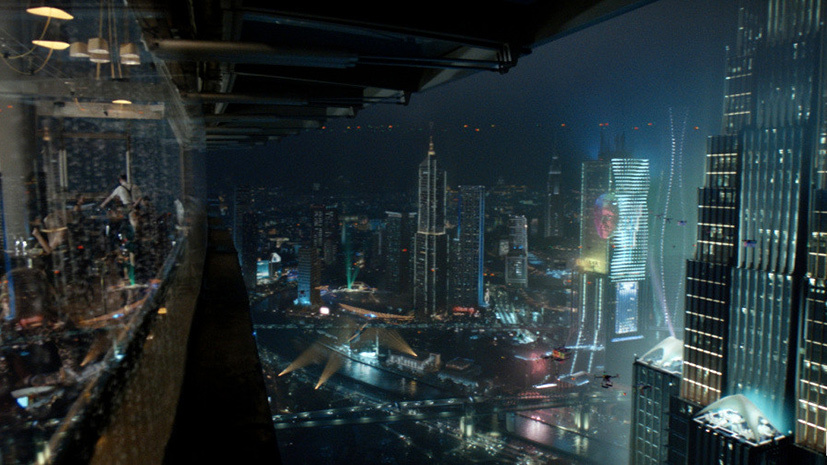On November 21, the fantastic movie “Outpost” was released by Russian director Yegor Baranov (franchise Gogol, the TV series Sparta and Fartsa) and screenwriter Ilya Kulikov (The Law of the Stone Jungle, Policeman from Rublevka, Chernobyl. Exclusion Zone"). The soundtrack to the Outpost was answered by Ryan Otter, whose tunes are played in many films and TV shows of Russian production in recent years, and the founder of Linkin Park, Mike Shinoda. He specially wrote the song fine for the picture.
The creators of the Outpost define its genre as fiction, a neo-noir war film. The action of the tape takes place after the apocalypse that covered the Earth. According to the plot, the planet - with the exception of the relatively small "circle of life" that fell on part of Russia, Ukraine, Belarus and Finland - is plunged into darkness. Electricity and mobile communications are cut off, people cease to show signs of life.
However, the threat cannot be identified. Different versions of what happened are put forward: a global terrorist attack or nuclear war. Surely it is only known that outside the "circle" people died instantly - some at the wheel, some at the dinner table. Moreover: soon the bodies begin to disappear without the slightest intervention of survivors or wild animals.
- © Shot from the movie Outpost (2019)
To find out the nature of the threat and understand how to counter it, the survivors gather an army and build outposts outside the "circle". One of them, near Kirov, gets four heroes.
Oleg (Alexey Chadov) - a professional military man. Before the disaster, he served on a contract basis and lived comfortably in Moscow, however, shortly before the blackout, he quarreled with his parents. Those remained in Samara and, apparently, died. The affairs of Yura (Peter Fedorov) before the tragedy (and even after) were in a different way: he barely made ends meet, working as a taxi driver, and also looked after his mother suffering from amnesia.
Yura is cynical, and he is not sorry for those who remain behind the "circle". On the contrary, he is glad to be among the “chosen ones”: only 0.5% of the world’s population survived (for example, according to the hero’s strange estimates, there are 1000 dead per survivor).
In dangerous missions, the military is accompanied by the correspondent Olya. She hopes to help people in ignorance and at the same time cope with her own fears. Also at the epicenter of the events is Alena (Lukerya Ilyashenko), a former club regular, a fatal woman. And now, a nurse. At the outpost, the heroine is led by tragic personal circumstances: she takes up the task to pay for the treatment of a sister with cancer. Well, in a secret laboratory located somewhere in the dysfunctional Arab quarter of Moscow, Zhenya (Philip Avdeev) and Eid (Artyom Tkachenko) are looking for ways to counter the threat.
- © Shot from the movie Outpost (2019)
Moscow looks unrecognizable - the city is filled with skyscrapers, drones and holograms are constantly catching my eye. Army equipment also stepped forward. The military has at its disposal high-tech armor and the latest technology (real tanks borrowed by the Ministry of Defense were shot in the film). Units are apparently accompanied by harmless robotic dogs.
In Moscow, a peaceful life continues, but at the outpost is restless. Even the surrounding nature seems hostile, and the inability to assess the situation only raises alarm. The soldiers beat off one attack, and then sent to reconnaissance.
The gloomy, decadent atmosphere of the Outpost serves as a reminder of the Terminator franchise: evil is indestructible, and the prevention of a catastrophe does not at all mean the advent of a bright future.
The filmmakers took care of creating multi-dimensional images of heroes. So, at the end of the story, it will be difficult for the viewer to decide who is considered a positive character and who is considered a negative. For example, on the example of Jura, filmmakers show primitive instincts - the will to reproduce and kill. His leadership qualities are expressed (the hero takes command of the detachment), he does not give in to fear, but at the same time, unlike other heroes, he is absolutely indifferent to other people's sufferings.
Cultural codes are actively exploited in the film - from religious motives to the theory of psychoanalysis. So, Eid is the name of the unconscious part of the psyche in the theory of Sigmund Freud. Moreover, the hero’s story is closely connected with biblical motives. One of the aliens is called Ra - as the god of the sun in the religion of the ancient Egyptians.
Unfortunately, the film’s noir character is expressed, among other things, in black humor that is inappropriate against the backdrop of tragic scenes. So, after the battle, during which minor heroes sacrifice themselves for the sake of the main ones, absolutely leveling the drama of the situation over a bunch of corpses proudly rises a bloodied sign: "Caution, wet floor."

